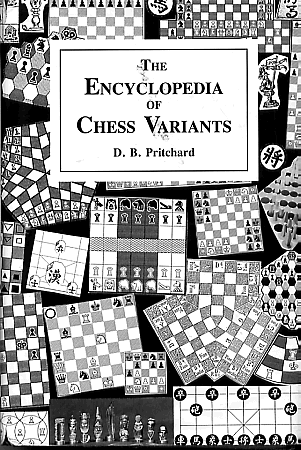The Encyclopedia of Chess Variants (Book Info)
The Encyclopedia of Chess Variants by David Pritchard contains historical information and rules of many, many chess variants. Here is some information on this book, with some additional links.
David B. Pritchard
The Encyclopedia of Chess Variants
Games and Puzzles Publications, Surrey, UK, 1994
384 pages
ISBN 0-9524142-0-1.

- A large collection of games related to, derived from or inspired by chess. Designed to entertain as well as to introduce many excellent yet largely unknown games, The Encyclopedia of Chess Variants will also serve as a reference work on chess variants - the first book in any language to attempt a comprehensive survey of the subject.
- The variants, which are arranged alphabetically and collected from all over the world, date from ancient times to the present day. About half can be played using an ordinary chess set. Popular variants such as Kriegspiel, Losing Chess and Progressive Chess are treated in depth with origins, history, rules, analysis, hints on play and annotated games, many between well-known players.
- There are up-to-the-minute sections on Burmese, Chinese, Japanese, Korean and Thai chess with guides to translating indigenous notation. Other regional variants are also covered together with the older forms of chess. Proprietary (commercial) variants number 160, many of them still on, the market.
- Here are games that take just a few minutes to play, others that may take a few hours. The variety is extraordinary: Alice, Bughouse, Choiss, Dragonfly, Enochian, Falcon-Hunter, Gay, ... and so on through the alphabet, a cavalcade of the imagination.
- Over 19400 variants - 384 pages - 540 diagrams
This book is out-of-print, but you may look for used copies on Amazon, or you may check out the online version of The Classified Encyclopedia of Chess Variants, which is an updated, posthumous version of this book completed and edited by John Beasley.
Links
- A review of this book by Philip M. Cohen.
- See also the book Popular Chess Variants, by the same author.
- Interview with David Pritchard.
Written by Hans L. Bodlaender.
WWW page created: February 19, 2003.
